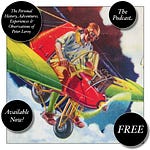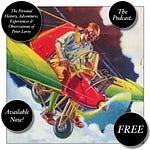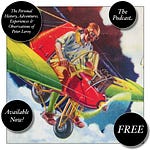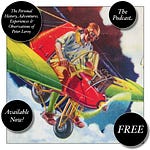“Shall I take your orders?” he asks.
“Let me ask you something first,” says Harold. He twitches on his seat with the pleasurable anticipation of being amusing. “Does the cuisine match the decor?”
The waiter smiles indulgently. “No, sir,” he says. “Our cooking is essentially Italian, but with the personal innovations of our chef.”
“Oh, good!” says Harold, and with an elaborate expression of relief he telegraphs the approach of the punch line. “I was afraid the special was going to be ‘crust of bread and day-old water.’”
The waiter smiles but shows no likelihood that he will laugh.
“Would you tell me about the pappardelle Toscana?” Belinda asks.
“Pappardelle alla Toscana,” he says with no hint of reproof, “is a traditional dish. Pappardelle is a wide egg noodle, very nice. Typically it’s made with ham and livers of chicken in a tomato sauce with mushrooms. Our chef uses a little pancetta in place of the ham, and porcini mushrooms. It’s very nice.” Since it is entirely proper to look at him while he is speaking, Belinda does look at him, closely. He speaks well, beautifully, in fact. Belinda listens to his recitation as to a poem. A student, she thinks, intelligent, dark, handsome, brooding mouth, but laughing eyes. Too young for me, alas.
“Would you like me to describe any other dishes?” the waiter asks.
Harold says, “I think Belinda would like you to go right through the menu.”
Gwen laughs. Belinda reddens. She smiles, but the smile doesn’t cover her embarrassment or annoyance. She gives Matthew a poke with the toe of her shoe, and he glances at her. He sees the most fleeting of sneers on her face, but she quickly turns toward the waiter, and her look turns seductive. In a throaty voice she says, “I certainly would.”
The waiter chuckles at this. “Perhaps you would like to know something about the tagliatelle con frutti di mare, signora?” he says as if he were a Venetian gigolo inviting her to enjoy the moonlight with him from a gondola on the Grand Canal.
“Mmm,” says Belinda, “it sounds — very interesting.” She raises a shoulder coyly, and the strap of her dress slips beguilingly off it. She catches it, just in time, it seems to Matthew, bats her lashes, and says, correcting him, “But it’s signorina, not signora.”
He says, “Scusi, signorina,” and from the way he says it, it might be Italian for “Later, when you finally manage to get free of these tedious people, why don’t you drop by my palazzo?” He begins to describe the dish, but Belinda stops him. In fact, she reaches out as if to touch him by way of stopping him but reaches only partway and says, “That’s all right. I’m familiar with it.”
They order, and Gwen orders the tagliatelle con frutti di mare, though she hasn’t the faintest idea what tagliatelle is.
“I don’t really know what I ordered,” she confesses when the waiter has gone. “What is tagliatelle, anyway?”
“I think that’s just the Italian word for linguine,” says Harold. Belinda hesitates for only a moment, to decide whether he’s making a joke, and when she concludes that he isn’t, she laughs heartily.
[to be continued]
Have you missed an episode or two or several?
You can begin reading at the beginning or you can catch up by visiting the archive or consulting the index to the Topical Guide.
You can listen to the episodes on the Personal History podcast. Begin at the beginning or scroll through the episodes to find what you’ve missed.
You can listen to “My Mother Takes a Tumble” and “Do Clams Bite?” complete and uninterrupted as audiobooks through YouTube.
You can ensure that you never miss a future issue by getting a free subscription. (You can help support the work by choosing a paid subscription instead.)
At Apple Books you can download free eBooks of Little Follies and Herb ’n’ Lorna.
You’ll find overviews of the entire work in An Introduction to The Personal History, Adventures, Experiences & Observations of Peter Leroy (a pdf document) and at Encyclopedia.com.












